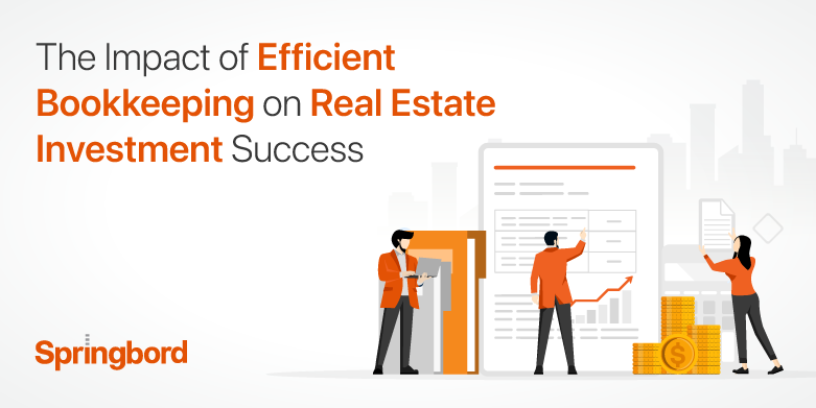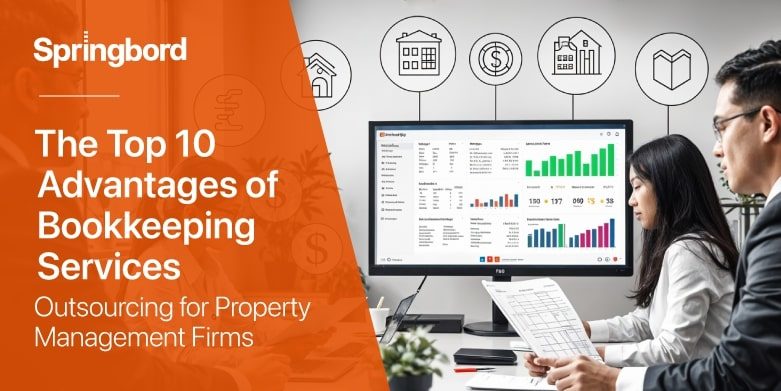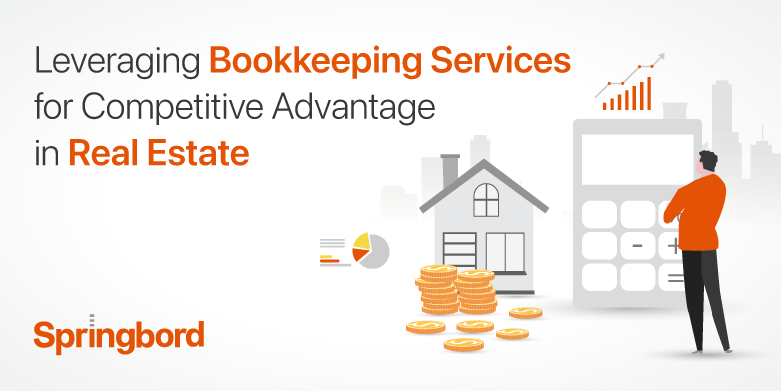 Read time 6 min
Read time 6 minThe rigorous demands of real estate investment underscore the vital role of proficient bookkeeping. Beyond mere transaction recording, efficient bookkeeping serves as the compass guiding investors through the complex landscape of financial management, compliance, and strategic planning.
The dynamic nature of real estate, with its multifaceted transactions, amplifies the need for a meticulous approach to financial tracking and analysis.
This blog delves into the critical aspects of bookkeeping that directly influence the success of real estate investments, offering insights that align with the sophisticated understanding of business owners.
The Role of Bookkeeping in Real Estate Investment
Efficient bookkeeping transcends the basic function of recording financial transactions; it is the backbone of strategic decision-making and financial health in the real estate sector.
Accurate and comprehensive financial records give investors a clear picture of their financial standing, enabling informed decisions that maximize returns and mitigate risks. The direct correlation between bookkeeping efficiency and investment success cannot be overstated, with well-managed books often heralding the difference between profitability and financial turmoil.
Springbord, with its cutting-edge solutions and expert insights into real estate bookkeeping, provides investors with the tools and knowledge necessary to harness the full potential of their investments. Our focus on integrating technology with traditional bookkeeping practices ensures that our clients stay ahead in a competitive market, making informed decisions that drive success.
The Foundation of Efficient Bookkeeping in Real Estate
Real estate investment demands a structured and methodical approach to financial management, making efficient bookkeeping an indispensable component.
The foundation of effective bookkeeping encompasses comprehensive accounting systems, regulatory compliance and tax optimization, and meticulous cash flow management. These elements are not only crucial for the day-to-day operation of a real estate business but also play a key role in its long-term success and scalability.
Comprehensive Accounting Systems
The adoption of robust software solutions for real-time financial tracking and management is crucial in the real estate sector. Tools like QuickBooks Online and Realtyzam have emerged as popular choices for their intuitive interfaces, powerful integrations, and extensive reporting capabilities.
QuickBooks Online, known for its wide acceptance and ease of use, starts at $30/month and offers a cloud-hosted deployment, making it accessible from anywhere. On the other hand, Realtyzam, specifically designed for real estate agents, starts at a more affordable price point of $9/month. It excels in real estate-specific metric tracking and simplifies the financial management process by offering features like bank feeds to import transactions automatically.
Regulatory Compliance and Tax Optimization
Understanding the complexities of real estate taxation and regulatory obligations is crucial for leveraging benefits and avoiding penalties. Real estate accounting software often comes equipped with features to assist in commission management, financial reporting, and contract management, ensuring compliance with industry standards and tax laws. These systems facilitate the calculation of commissions, and management of contracts including purchase agreements, lease agreements, and assignment contracts, thus ensuring all transactions are compliant and optimized for tax purposes.
Cash Flow Management
Efficient cash flow management is critical for the sustainability and growth of any real estate investment venture. Techniques for monitoring and optimizing cash flow include effective rent collection strategies, operational expense management, and financing cost assessments. By using real estate-specific software, investors can gain insights into their financial performance, including rental income, vacancy rates, and property expenses, enabling them to make informed decisions aimed at maximizing their cash flow.
Springbord’s expertise in providing cutting-edge bookkeeping solutions tailored to the real estate sector ensures that our clients are equipped with the necessary tools and insights to achieve their investment goals.
Our commitment to leveraging technology and industry best practices positions Springbord as a trusted partner for real estate professionals seeking to optimize their financial operations and drive success.
Advanced Bookkeeping Strategies for Real Estate Investors
Navigating the complexities of real estate investment requires not just an acute business acumen but also a keen understanding of the intricacies of financial management.
Among the most potent strategies in the arsenal of an astute real estate investor are cost segregation studies, 1031 exchanges, and the precise categorization of capital improvements vs. expenses. Each of these strategies serves a unique purpose in optimizing the financial landscape of real estate investments, offering paths to significant tax savings and enhanced financial reporting.
Cost Segregation Studies
Cost segregation is a strategic tax planning tool that enables real estate owners to accelerate depreciation deductions on specific property components, leading to substantial tax savings. A cost segregation study meticulously analyzes a property to identify and reclassify certain assets for accelerated depreciation.
This process involves breaking down the purchase price or construction cost of a property into various components that can be depreciated over a shorter period, typically 5, 7, or 15 years, instead of the standard 27.5 or 39 years for residential and commercial properties, respectively.
1031 Exchanges
A 1031 exchange is another key method, that allows investors to defer capital gains taxes by reinvesting the proceeds from the sale of a property into a like-kind property.
This complex manoeuvre requires meticulous bookkeeping and timing to ensure compliance with IRS rules, including the identification of a replacement property within 45 days and closing within 180 days from the sale of the relinquished property.
Real estate investors use 1031 exchanges to reallocate their investment portfolios without the immediate tax burden, fostering continued growth and investment diversification.
Capitalization vs. Expense
Determining whether to capitalize or expense renovations and repairs is crucial for accurate financial reporting and tax optimization. Capital improvements, which extend the property’s life, increase its value, or adapt it to new uses, must be capitalized and depreciated over their useful life. In contrast, expenses for repairs and maintenance that do not add significant value to the property can be deducted in the year they are incurred. Correct classification ensures compliance with IRS guidelines and can significantly affect an investor’s taxable income and cash flow.
Implementing these advanced bookkeeping strategies can significantly impact the financial success of real estate investments. However, the complexity and nuances of tax laws surrounding these strategies necessitate a professional approach.
Springbord, with its deep understanding of real estate bookkeeping and tax planning, offers the expertise necessary to navigate these waters. Our services are designed to maximize tax savings and financial performance for real estate investors, ensuring compliance and optimizing investment returns through strategic financial management.
Risk Management Through Accurate Bookkeeping
In real estate investment, managing risk through accurate bookkeeping is not just a best practice but a necessity for sustaining growth and safeguarding assets. Advanced bookkeeping strategies, when correctly implemented, serve as a potent tool in identifying financial anomalies, managing leverage, and ensuring a diversified investment portfolio.
Detecting Financial Anomalies
Real estate Ponzi schemes and other forms of financial fraud have shown a disturbing uptick, with investors losing over $1 billion in total to such schemes. The rise in cybercrime, particularly during the pandemic, has made real estate markets a lucrative target for fraudsters, exploiting the booming housing prices and the digital shift in property transactions. In 2020, the U.S. saw losses amounting to more than $213 million due to real estate scams, highlighting the critical need for vigilance in financial transactions.
The use of advanced anomaly detection techniques, like those offered by MindBridge, leverages artificial intelligence and machine learning to analyze financial data for unusual patterns, providing a vital safeguard against potential fraud.
Leverage Ratios and Debt Management
A key component of risk management in real estate investment is the effective handling of leverage through detailed analysis of the Debt Service Coverage Ratio (DSCR).
This ratio is crucial in evaluating a property’s ability to generate enough income to cover its debt obligations, thereby guiding investors in making informed decisions about acquiring, holding, or selling assets based on their financial performance.
Investment Portfolio Diversification
The diversification of an investment portfolio stands as a fundamental strategy in mitigating risk, enabling investors to spread potential losses across different asset types or markets. Accurate and diligent bookkeeping plays a pivotal role in this process, providing the data necessary to assess the financial health of various investments and identifying opportunities for diversification. This strategic approach not only helps in balancing the portfolio but also in capturing growth opportunities across different segments of the real estate market.
The rise in real estate fraud, such as mortgage fraud, title fraud, and scams involving Real Estate Investment Trusts (REITs), further emphasizes the importance of employing sophisticated AI tools for effective fraud detection. AI-powered solutions are critical in navigating the complexities of modern financial crimes, offering capabilities like advanced pattern recognition, real-time monitoring, and integration with diverse data sources to identify and mitigate risks efficiently.
Springbord, with its expertise in real estate bookkeeping and risk management, stands ready to assist investors in navigating these challenges. Our suite of services, powered by advanced analytics and AI, enables investors to maintain accurate financial records, identify and respond to potential risks, and make informed decisions that optimize their investment outcomes.
Conclusion
Efficient bookkeeping is crucial for real estate investment success, serving as the backbone of strategic decision-making and financial health. efficient bookkeeping is not just a procedural task in the realm of real estate investment; it’s a strategic asset that drives success.
Springbord’s comprehensive solutions of efficient bookkeeping and expertise in leveraging advanced analytics and AI technologies equip investors to navigate market complexities, optimize financial operations, and achieve sustainable success in real estate investment.
Ready to optimize your financial operations and achieve sustainable success?
Contact Springbord today and take the first step towards securing your investment’s future.







